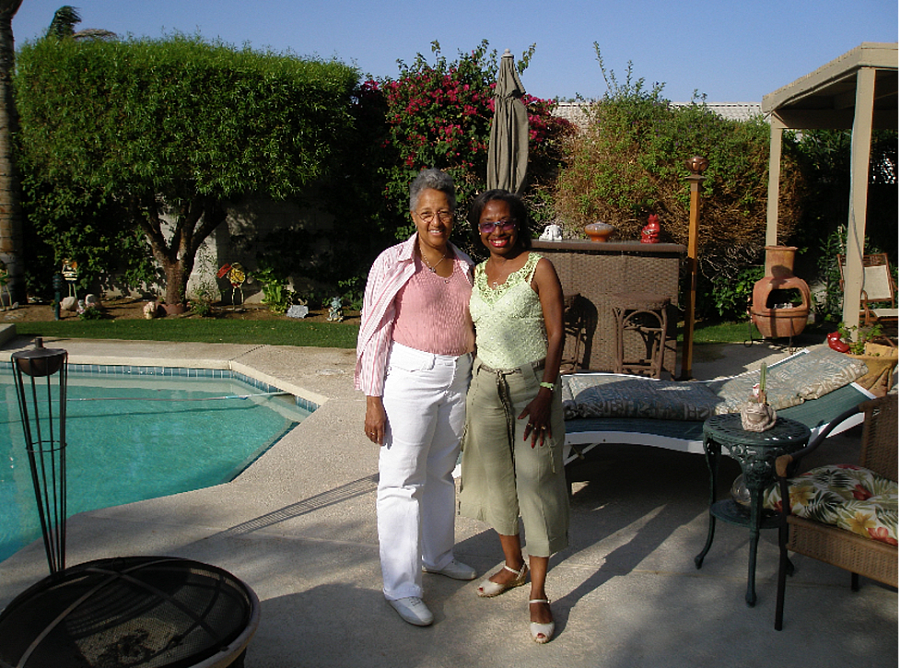Inland Empire Seniors Encounter Challenges in Accessing Reliable Transportation
The story was co-published with the Black Voice News as part of the 2024 Ethnic Media Collaborative, Healing California.

Today about 15% of inland area residents are 65 years of age and older. In the coming years this group will experience the highest growth rate of any other age group in the region. With the compounding financial struggles of healthcare and caregiving, additional costs can send older adults into poverty or even homelessness.
source: csusb.edu
Marjorie Lauderdale, a resident of Palm Springs, is a caregiver. She is also 80 years old. Lauderdale cares for her wife, Deidre, 77, who suffered multiple strokes.
Marjorie starts her day by changing Deidre’s incontinence pads, getting her dressed, putting her in a wheelchair and preparing her breakfast. Around midday, Marjorie lays Deidre back in bed and later gets her up and changes her which takes about 45 minutes. The days repeat.
“It’s very hard. There are times when I’m depressed, times when I cry, times when I'm hurting and I can’t lift her anymore, but I end up having to,” Marjorie said.
Marjorie is one of more than four million California family caregivers who spends most of her time caring for a loved one. Marjorie is also part of the 18.8% of caregivers who are over the age of 65.
“I’m the only caretaker, so I sort of have to put everything aside to take care of her,” Marjorie said. “I know that’s not good, because I need to take care of myself, but she’s not in a position to take care of herself.”
Over the next 20 years, adults 65 and older will experience the highest growth rate of any other age group in the Inland Empire. As it stands, however, this vast region is not prepared to accommodate their growing needs.
A 2023 report published by the Inland Empire - Master Plan for Aging (IE-MPA) Advisory Committee used community focus groups to conduct a needs assessment survey. Among the community groups engaged were low-income or unhoused individuals, communities of color, rural populations and informal caregivers.
“[The focus groups] gave us the opportunity to listen to not only what the community needs are, but how they want to be reached and how they want to be treated…,” said Carmen Estrada, treasurer of the Inland Coalition on Aging and executive director of the Inland Caregiver Resource Center.
“We had lots of friends before she became terminal, and then suddenly everyone sort of disappeared from our lives. We have no support group at all,” Marjorie said. Marjorie herself previously had cancer and today continues to face ongoing health issues that she is unable to attend to.
In the Inland Empire, many older adults living in rural areas face additional challenges, including access to reliable transportation and adequate care. As the number of seniors continues to increase, so does the need for support services.
As the Inland Empire works to address the needs of the region’s aging population, the IE-MPA is a step toward building a sustainable solution toward ensuring that aging populations have access to resources and the support needed to age comfortably.

Deidre Lauderdale (left) and Marjorie Lauderdale (right) enjoying an afternoon in their backyard before Deidre’s massive stroke.
Courtesy of Marjorie Lauderdale
The price of caregiving
Before Marjorie and Deidre both experienced health issues, they were able to travel the world together. They had saved a considerable amount of money for retirement.
“Approximately four weeks after I had my breast cancer surgery, Deidre had a massive stroke. So that started the ball [rolling] as far as [the] financial burden,” Marjorie said.
She explained that as she received cancer treatment she struggled to find someone to care for Deidre. “Needless to say, it ate up the little money that we had,” she explained.
With the compounding financial struggle of healthcare and caregiving, additional costs can send older adults into poverty or even homelessness.
“I tried saving and everything, but along with paying for her medication, my medication, doctor bills and everything, it put us over the edge,” said Marjorie. Adding, that if it wasn’t for her church, that helped her pay the taxes, her home would have gone into foreclosure.
Marjorie shared how at times, she felt judgment from some friends – as if she had misspent her retirement savings.
“But I didn't. I'm very frugal. I saved money and saved money religiously,” Marjorie said, explaining how the costs of adult diapers, lotions, medications and other products add to daily expenses.
“We tried to prepare in every way possible, but when the bills started coming in, it just took everything we had,” she advised.
Genworth, a life insurance company, studied the median cost of care across the U.S. by surveying 429 cities and towns across all 50 states in 2023. The report found that in California, the annual median costs for a home health aid was $84,656 while an assisted living facility was $75,000.
A West Health and Gallup survey indicated a large proportion of the older adult population copes with healthcare costs by forgoing treatments and cutting back on basic and essential needs. Twelve percent of respondents aged 65 and older, representing approximately 6.5 million people, said they, or a member of their household, had a health problem in the last year and they did not seek treatment due to cost. Eleven percent of Americans in this age group — six million people — reported they or a family member skipped buying prescribed pills to save money.
Addressing transportation needs for aging populations
Marjorie shared that taking public transit to Deidre’s appointments would be nearly impossible because the closest stop is far from their home. An additional challenge is the heat in Palm Springs being too intense for them to wait at the bus stop, even if there was one closer.
In Riverside County, a study showed that 20% of adults aged 60 and older surveyed by the Area Agency on Aging, did not have transportation to get to medical appointments or treatments.
In the Inland Empire’s local master plan, Estrada explained that one of the main objectives for transportation was increasing awareness to the community of the opportunities available, as well as for the community to provide input on what their transportation needs are.
“It’s us communicating what we need to these transit agencies, but then also giving the opportunity to the people [in the community] to express what they need,” Estrada said.
Maureen Salinas-Ali, witnessed what it means to be a caregiver when she watched both of her grandmothers care for her grandfathers — one who had Parkinson’s disease and the other who had dementia.
Salinas-Ali spent years working with seniors in a dialysis clinic and then at Kaiser as the End of Life Options coordinator. While working in these facilities, the number one question she received from patients was where they could seek transportation help.
After years of wanting to create a nonprofit to help address this need, Salinas-Ali founded Inland Empire Senior Support (IESS) in the last year. The organization connects seniors with existing transportation companies and provides funding to cover costs. Their outreach efforts include presentations at dialysis clinics and senior centers where many patients are in need of transportation services.
Because IESS is a new organization, they don’t yet qualify for state or government funding, despite the growing need for their services.
“We have to have a history of helping people, but how do we help people if we can’t get these big grants [to assist with] funding?” asked Salinas-Ali. “It’s an uphill battle for sure, but we’re getting there.”
According to Estrada, caregivers run into difficulties when it comes to transportation. Many find it challenging to transport the person they care for, especially when it comes to getting in and out of the car if they have limited mobility. Caregivers are unable to utilize transportation agencies due to costs. They also shared concerns about determining the right time to revoke a license from someone with a cognitive impairment who is receiving care.
Through the development of IE-MPA, the Inland Coalition on Aging created a workgroup to identify objectives and solutions to remedy these concerns. They are presenting these findings at an Inland Empire Health Plan conference later this month.
The IE-MPA’s recommendations for transportation included free or low-cost public transit for older adults. It also identified the need for local governments to encourage better transit — both public and private — through promoting more transit enterprises and better regulating the quality and reliability of existing services.
Additionally, the recommendations advocate for doctors to better communicate a clearer process, next steps and resources for someone who has their license taken away. An all-encompassing final recommendation is for the expansion of Medicare Part D, which allows for medical transportation.
Implementing the recommendations identified by IE-MPA continues to be a work in progress. In May 2023, the California Department on Aging funded the ongoing work by the Inland Coalition through June 2025. They are currently working on implementing the master plan. Next year there will be a public release event for the region’s master plan.
“It’s a plan that we’re going to continue to change and continue to adapt to the continued changes and needs of our community,” Estrada said.
As the IE-MPA works on implementing recommendations to improve transportation services for older adults, some solutions are already at work. In Riverside County, Riverside Connect is an origin-to-destination advanced reservation transportation service for seniors and persons with disabilities. This service honors any current valid identification card that has been issued to an individual with disabilities by another transit operator for paratransit services.
Through San Bernardino County's Multipurpose Senior Services Program (MSSP), a team of health and social service professionals provides each client with a complete health and psychosocial assessment to determine the services needed. These services are routinely provided by local community vendors and can include transportation to non-emergency medical appointments.
As solutions are developed by local jurisdictions as well as on-the-ground organizations, seniors like Lauderdale do what they can to find moments of joy and relief in the midst of these challenges.
“Listening to music brings me a little joy. I love jazz… I can't listen to oldies because it brings back memories,” said Lauderdale. “I like old movies and comedies, which we watch together. I enjoy seeing [Deidre] laugh when there's something that she can laugh about.”
The IE-MPA transportation recommendations finclude free or low-cost public transit for older adults. It also identified the need for local governments to encourage better transit — both public and private — through promoting more transit enterprises and better regulating the quality and reliability of existing services.
This Black Voice News project is supported by the USC Annenberg Center for Health Journalism, and is part of “Healing California,” a yearlong reporting Ethnic Media Collaborative venture with print, online and broadcast outlets across California.
